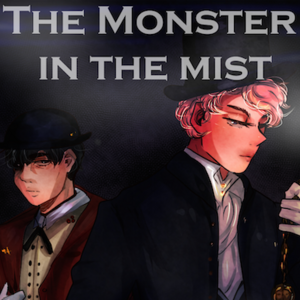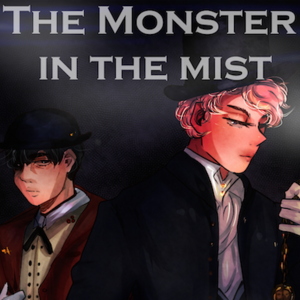Franz stroked the thin fabric of his gloved hands. He often fiddled with his clothing in stressful situations, nothing out of the ordinary. He waited outside the oak door of the bank manager, Mr. Williams. He had been introduced to Franz when he arrived at Auchtermuchty when he was 6. He was close friends with Franz’s late father, Otto, a mine worker. It was strange for one to befriend another of a completely different class, but Otto was a foreigner and foreigners were treated almost like royalty in Auchtermuchty, considering their small and isolated lives. Otto was a passive and plain man and the bank manager, Peter, was the same.
Before their sudden and strange disappearance, Otto left a letter at Peter’s office asking him to look after his only son. So, as Franz waited outside his office, he remembered the many debts he owed to this man. He would be living on the streets was it not for him.
The door creaked open. A pale woman peeked out, her eyes glued to the many papers she analyzed in her hands. Franz stood and lowered his hat.
“Mr. Williams will see you now.” She stated and disappeared behind the door.
Franz nodded appreciatively and shuffled his way inside, careful not to seem eager or nervous. Peter Williams was not fond of descriptive body language. Franz was greeted by the aroma of the many checking books and files inside the waiting room where his secretary worked. A low flicker of the candlelight lit on her desk illuminated her pleasant features, and Franz caught himself staring at her.
She lifted her eyes to meet his and smiled politely, “He’s behind that door, sir.”
Franz’s face became flushed as he hid in the shadows of his collared jacket. He moved a hand to the door and turned the knob in haste, stepping inside the office as quick as he could manage. He shut the door behind him and internally cursed at himself for being such an intrusive man.
“Schwarz.”
Mr. Williams sat, proudly behind his neat desk; polished to the shine of a mirror in the royal castle. His binoculars glistened on the hook of his nose, two pale eyes behind them gazed upon the young man.
“How have you been, boy? How is the knee?”
Franz smiled weakly and took the seat that Mr. Williams motioned towards,
“I’ve been great, sir. The knee...has been only a little bothersome.”
He was lying. Since the beginning of the month, his knee had been giving out every so often. Three weeks ago, his knee decided to play its trick while he stepped off a carriage and he landed upon the humiliating and troublesome mush that the horse has laid that morning. That was when he purchased the cane and started taking smaller steps when walking around. As if he wasn’t already mistaken for an old man without the limp.
“How long have you been with us now? 9 years?” Mr. Williams folded his arms across his chest, “My, I remember when you reached my hip. Now, you reach my...shoulder.”
He chuckled, as one does when one pokes fun at the height of another. Franz let a soft cough escape him before Mr. Williams ceased his laughter.
“Schwarz...you do remarkable work. I never expected such care and tranquility from a miner. A fine banker indeed. Your colleagues would agree with me, many of them look up to you. And I think it's about time we looked over your tasks.”
Franz understood where he was going with this. He was to let him go, free himself from caring for a nearly 30-year-old ward.
“Listen...I understand that working here wasn’t exactly your plan in life.”
Franz listened in. Mr. Williams had a stack of papers on his desk. They were upside down but Franz could see the blue seal on the envelope underneath them. The seal of The Auchtermuchty Division Yard. For the first time in the last 18 years, Franz felt hopeful.
“Where do you get your suits tailored, Schwarz?”
Franz responded, “Mr. Tilly’s, sir.”
Mr. Williams nodded, “Prepare to be measured for a new uniform.”
Franz leaned forward in his leather chair, his leg bouncing from excitement. He dared inquire more.
“A police uniform...sir?”
Mr. Williams’s eyes sparkled. His hands taped rhythmically on the desk, “Oh no, Schwarz. Even better.”
Even better?
Mr. Williams lifted a letter from his pile and held it out for Franz’s clammy hands to grasp it. Franz read the official blueprint at the heading of the crisp paper.
Taxation and Collection Services.
His stomach dropped.
“Tax...collection? Mr. Williams-”
Before he could finish the manager had already risen to his feet and extended a hand for the young man to shake.
“Although you will be leaving us, Schwarz, I am quite proud of this advancement. I’m sure Otto would as well.
Franz felt steam in his eyes, heat in his cheeks, and an itch on his sweating head. He was not feeling this from excitement, no. Not unless the pure dread he felt in that moment could share the same name as excitement.
“Wonderful,” Franz said and reached for his guardian’s hand.
Wonderful.
. . . . . .
Franz lived on the little corner of the market street. It was the old residence of Mr. Williams, pale and old much like its resident. It bore a resemblance to a courthouse but after a few years of wear and tear. Franz stepped out of the carriage and gazed upon its entrance. He was grateful for his blessings. A job, a home, and a reputation. Not many miners could understand the luxury of his living conditions, but he still felt unfulfilled. Franz looked at his cane, a small crack had begun to appear on the tip of the wood. It wasn’t very noticeable, but he could tell that with some time and more humidity from the fog, it would begin to chip the polish. He made a mental note to replace it as soon as he could.
He passed the dark gates that led to the staircase of his home. In a nearby tree, a raven cawed.
When Franz was younger, the tree was the exact tree his father would always find him atop. Franz never noticed the danger of heights to a fragile bodied person like him, but his father always made it his job to remind him.
“Get down before you break a leg.”
“Don’t run too fast, your ankles could get swollen.”
“Make sure you hold onto the banister, one fall can kill you.”
Otto was in some sense right about warning him, but at the same time, Franz wondered if maybe it was his father’s own fault that he grew into such a like-minded coward.
The doors of the estate swung open with a low creak, his maid stood at the entrance and gave a bow. He nodded and motioned for her to continue her duties. He removed his coat and set it aside on the nearby hook that hung near the door. An instant weight was lifted from his shoulders and he straightened his back.
The entrance of the estate was not a sight to behold. When one entered, they were greeted by a vase that was missing the flowers that fulfilled its purpose. Behind the vase that rested on a marble table, a staircase led to the second floor, polished by the only maid in the home. At the top of the stairs, a painting of Peter Williams, his eyes followed whoever entered his estate. He bore a serious frown and a navy suit. Two pairs of wrinkly hands clenched at his sides, one wearing the ring of his family. At his left side, a hunting dog with a dead goose in its mouth. At his right side, a youthful sheep with a pale coat of wool. Franz hated that painting but was forbidden from removing it. In the hallways that led to the other rooms just beyond the entrance, other portraits decorated the wine colored walls. One was of Mr. Williams late wife, Edna. She wore a satin dress the same color as the pale goose at his side. It was decorated by the wings of the dragonflies that resided near the pond in the center of the island. She had her raven hair tied above her forehead like a beehive. Her eyes were shamefully glued to the ground as if she was not confident enough to declare her state in the home. Her hands were folded neatly in front of her, holding onto the handle of a pink lace fan.
The next portrait was of Mr. Williams’ son, Albert Williams. He struck a strong resemblance to the ghostly appearance of his mother. But his eyes shifted to the side of the frame. Albert worked as an assistant in the royal palace and had no relationship with his father. His painting was aged many years and was rushed, Franz could tell since the bottom of his suit was almost impressionistic of the embroidery that decorated the fabric.
And at the very end of the right hall, a small portrait of 15-year-old Franz, in his first banker’s suit. It looked too big for him, the sleeves were folded above his wrists, and the buttons were hanging limply on the collar. His hands rested at loosely at his sides. He had his hair combed back. It created a hollow spotlight on the sadness that lurked in his glass eyes.
The portrait was commissioned around the time his father and mother disappeared, a gloomy day for both him and Peter. To tie it all off, he was trussed up with an ebony coat over his bony shoulders, a red ribbon in the front.
Red. What a strange color. Franz never fancied it, he believed it to be too passionate, too alive for him. But his mother had always found a way to sneak it into his clothing. A red collar, a red ribbon, a red coat, a red scarf. He had purchased a red cane specifically because of her. She told him that it was a color that spoke many words to someone’s eyes, almost like a poem in vibrant hues. She was an odd woman. Otto always believed that she was nothing short of genius. Franz wondered how his father could be so plain and yet adore such a curiously wondrous woman.
Franz stepped into his office, lit a candle, and shifted himself into his leather seat. A cup of tea was already set for him, the pastel color of the blue teacup stood out from the dark shadows of his enclosed office. He picked it up and raised it to his mouth and let the smoke brush against his lips.
He looked at the books still open on his desk, his scribbles like loose pieces of string decorated the tinted pages. He sipped the tea and paused a moment, the ticking of the clock echoing in the emptiness of the estate.
“Hmph.” He sighed and swallowed.












Comments (3)
See all